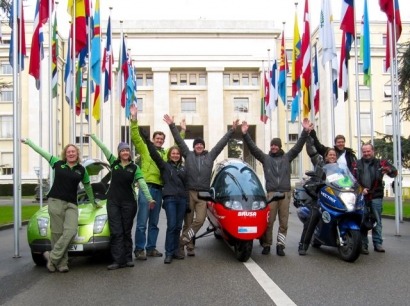
Yesterday morning, the three surviving teams (Orlikon Solar Racing Team from Switzerland with its Zerotracer, Team Trev from Australia with its TREV, and the Vectrix Team from Germany) set out from Le Bourget du Lac in the Rhône-Alpes region of France to cross the border into Switzerland on the last leg of their mammoth journey. After enduring a myriad of weather conditions along their route, the contestants were faced with snow in the closing stages; entering Geneva in real winter conditions.
However, they arrived on time, and in honour of completing the Zero Emissions Race, the gates of United Nations Palace opened once again back where it had all started 11 weeks before. Behind them lay a journey that took the three electric vehicles across Europe, Asia and North America.
The aim of the Zero Emissions Race was to promote renewable, emissions-free energy sources to power transport, and during their journey the teams stopped in Cancún (Mexico) in time for the World Climate Change Conference. The accomplishment represented a major milestone in the history of electric vehicles and helped to prove the efficiency and reliability of electric mobility, even when driving across continents, in deserts and mountains and through variable road and weather conditions.
During this longest and hardest electric car race ever, the challenges of the Zero Emissions Race were extremely hard to cope with at times at a personal level, exacerbated by the fatigue of 500 km or so daily driving, and the tough road conditions in many places. Despite these difficulties, Tour Director, Louis Palmer, said the teams performed extraordinary well.
The Zero Emissions Race was not about speed, but about other judgment criteria including vehicle reliability, energy efficiency, utility to everyday life, design and safety. Almost each day, the teams faced competition against new criteria in these categories, and they received points according to their performance in each.
Ooelikon Zerotracer wins
After this endurance challenge for both human and vehicle, which even involved one of the teams – the Power Plaza Team from South Korea – dropping out due to technical difficulties, the Swiss team came in winners, followed by Germany and Australia.
In doing so, the Oerlikon Solar Racing Team set a new record. For the first time in history, the highly efficient electro-vehicle, developed by the Swiss company Designwerk, managed to cover such an immense distance within 80 days.
“It is great that our team was able to win this very demanding race. This shows that emission-free mobility solutions are useful for everyday life even in adverse conditions. The Zerotracer is a real milestone on the path to use solar energy as a form of fuel in an economically viable manner and thus to create a real alternative for the mobile world of tomorrow,” said Helmut Frankenberger, CEO of Oerlikon Solar.
The Zerotracer is a fully-enclosed electric motorbike, offering the comforts of a car and the driving experience of a motorbike. The body is a kevlar monocoque, a technique derived from Formula 1 and IndyCar construction. Theoretically, the vehicle can reach speeds well beyond 300km/h (currently electronically limited to 250km/h) and travel over 500 km on one charge using a high energy density battery. Quick charging (80%) needs less than half an hour, fully charging needs less than 2 hours. Due to its superior aerodynamics (Cd 0.18) and highly efficient electric drivetrain, the Zerotracer is also able to accelerate faster than a Porsche 911.
Plans for the next Zero Emissions Race are already well under way, and it will take place in 2012. For further details contact the event organisers.
For additional information:


